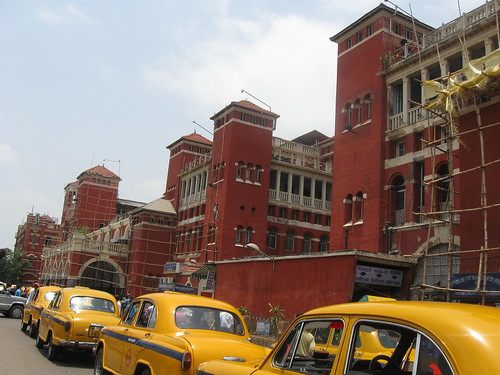Unfortunately, as
one who is still working on a
manuscript that was to have been completed and submitted last year (or was it
the year before?), I cannot really complain about the heat in Delhi. If
anything, it is forcing me to remain indoors, undistracted by the pleasures of
gallivanting here or there and get my ass moving on what is, with ironical aptness,
called “The Heat and Dust Project”.
The afternoons outside our tiny
flat are filled with the solid quiet intense white-heat that stands like a
handsome asura, the guardian of the Delhi summer; the neighbourhood dogs rush
about busily in the sun with a frenzy that is part sexual. There is a water
booth for them where they mill around at lunchtime, bossing over the thirsty
mynas who wait patiently in queue; and then, suddenly, they vanish. To sleep beneath
the green benches, stretch under limpid shadows by the mini-forests that
intervene our campus. But dusk is long
and lazy and by the time the dogs are roused and heard barking again, the four
neem trees outside our Council Housish block – where the Cornell-red brick
façade has been leached to a dull gentle redwood by the years in extreme
temperatures – the four neem trees that
cast their shadows on our walls go shee
shee shee.
Sometimes in the late afternoon,
there is a lull when the sky seems to darken. The peacocks call out to each
other. The neem trees sway their branches madly in the wind.
But
mostly one is disappointed – there comes but a brief spell of rain.
When I was a
girl my mother and aunts would assemble at my grandparents’ country house in
Jharkhand for the summer holidays. In hindsight I know those were probably the
happiest holidays possible for a child, though at the time I used to be extremely
jealous of my quintessentially Bengali friends who, ably carrying the mantle of
Bengal’s famed wanderlust, went on fancy holidays to exotic locations. My Bihari
(now Jharkhandi) parents, au contraire, would pine for the smell of the reddish
lands they had grown up in, the unique green of its landscape, the sweetness of
its water.
My
days on holiday would begin with homework (in that matter, my mother combined
the worst of Bengali and Bihari strictures) and a glass of fresh cow’s milk. I
hated both with passion. But then, after a while, I would be let off – and then
I would spend the entire day roaming in the sun with my holiday best-friends,
local girls who knew every nook and cranny of the valley behind the house that
led to a large pond and then, further away, to hills. But we were not allowed
to venture that far, to any place really
interesting. So we would walk about
aimlessly, laugh and gossip, collect small ripe mangoes in handkerchiefs, bite
them at the top, and then suck the juice. We would visit neighbours. We would
laze. I would lose all my citifications and relax into bliss.
After a few days, my usual
impulse of over-reaching would rear its head, and my friends and I would decide
we should stage an entertainment for the benefit of our families and sundry
others – mostly my grandfather’s tribal friends, associates and lackeys – who
might want to drop by. I would usually be the director. My friend Jyoti would
be the chief star. If my youngest aunt’s daughter was visiting too, then there
would most definitely be another rival director. The stage would be the inside red
verandah of the house that led to the yard. The audience would sit in the yard,
the actors would grace the verandah, my grandmother’s best bedsheets would be
the curtains, and my eldest cousin R’s tape recorder would provide filler
music. (The songs from “Phir Teri Kaahaani Yaad Aayi” were the rage one summer
I remember.) The local bank manager’s wife was the guest of honour. There was a
play (my piece de resistance), some Bollywood dancing (Jyoti’s piece de
resistance) and some Rabindra nritya (the rival director’s piece de
resistance).
And then the summer holidays would
end and we would travel all evening to take the train from Ranchi at night, eat
luchi and potato curry in our compartments, and in the morning, reach Howrah
almost alongside the monsoon. My heart would expand slightly at the sight of
the gracious red buildings of Howrah station, and my father waiting for us.
These days I realize what it was that made
summer so special those years. For summer was about my mother and aunts becoming
girls again, at their parents’, a peculiar condition that I cannot explain –
but which I always slip into myself when I visit my Mum. But there was
something about the voice, the step, the telling of sorrows, the discussing of
futures, the unique mix of tensions and joy. It has been long since I have been
able to fashion that long languorous sense of happiness out of my now adult summers.
The town
remains; the house remains against the backdrop of Maoist realities; May and
June come and go; my grandparents are now gone, though in my mind they remain inextricably
linked to still summer afternoons and my theories of joy.


No comments:
Post a Comment